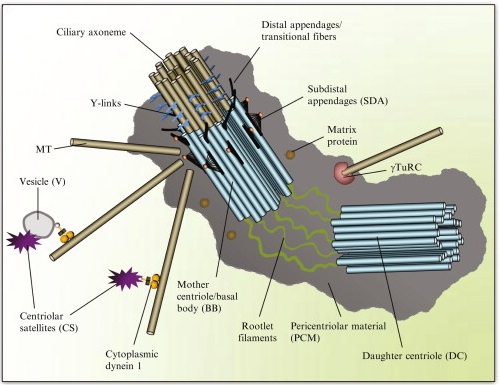Centrosome Proteomics Services
The centrosome is an important subcellular structure within the cell, with primary functions including serving as the microtubule organizing center (MTOC), regulating cell division, and establishing cell polarity. The function of the centrosome depends on multiple proteins that interact with it, which play a crucial role in maintaining cell structure, substance transport, and the cell division process. Using proteomics and high-resolution mass spectrometry techniques, centrosome proteomics analysis can precisely identify and quantify the protein components within the centrosome, revealing its key functions in cellular biological processes.
Centrosome proteomics services are widely applied across various fields. In plant research, the centrosome plays a vital role in cell division and plant growth and development. In the field of cell biology, this service helps researchers study the centrosome's critical role in cell polarity and division. In cancer and neurodegenerative disease research, dysfunction of centrosome proteins is a key research focus. Additionally, it can be used to explore the dynamic regulation of intracellular substance transport and the cytoskeleton.

Jakobsen, L. et al. Methods in Enzymology, 2013.
Figure 1. The Ultrastructure of the Human Centrosome.
Services at MtoZ Biolabs
Based on high-resolution mass spectrometry platforms, MtoZ Biolabs offers centrosome proteomics services that focus on the analysis of the centrosome proteome. We efficiently isolate centrosomal proteins and precisely identify and quantify their components. Through a standardized centrosome isolation and extraction process, the service provides comprehensive data, including centrosomal membrane proteins, matrix proteins, and more, covering protein identification, abundance, post-translational modifications, and dynamic changes. This service helps researchers gain a deeper understanding of the key role of centrosomes, providing essential data support for fields such as cell biology, plant science, and cancer research.
Analysis Workflow
1. Sample Preparation and Centrosome Isolation
Using differential centrifugation or density gradient separation techniques, centrosomes are efficiently isolated from cell or tissue samples, ensuring their purity and integrity.
2. Protein Extraction and Processing
Optimized buffers are used to extract centrosomal proteins, followed by enzymatic digestion to generate peptide fragments suitable for mass spectrometry analysis.
3. Mass Spectrometry Analysis
Using high-resolution mass spectrometry platforms (such as LC-MS/MS), proteins are qualitatively and quantitatively analyzed to identify and quantify the protein components within the centrosome.
4. Data Analysis and Result Interpretation
Through multivariate statistical analysis and bioinformatics tools, we provide in-depth analysis of protein function annotation, interaction networks, pathway enrichment, etc., revealing the role of centrosomal proteins in cellular functions.
Sample Submission Suggestions
1. Sample Types
Supports various sample types, including mammalian cells, tissue samples, and other samples suitable for centrosome isolation. It is recommended to provide a sufficient amount of cells or tissue samples to ensure high purity of centrosome separation.
2. Sample Storage and Transportation
Samples should be stored at −80°C immediately after processing and transported using dry ice to ensure cold chain transport, avoiding repeated freeze-thaw cycles that could compromise centrosome function.
3. Sample Handling
Samples should be avoided from repeated freeze-thaw cycles and should be stored under fresh or rapid freezing conditions. If the samples have undergone preliminary processing, please provide relevant processing information to optimize the subsequent workflow.
Service Advantages
1. High Sensitivity Detection
Relying on advanced mass spectrometry platforms, we ensure high-sensitivity detection of centrosome proteins, accurately identifying low-abundance proteins and providing precise quantitative data for research.
2. One-Time-Charge
Our pricing is transparent, no hidden fees or additional costs.
3. In-depth Data Interpretation
By utilizing bioinformatics tools, we conduct in-depth analysis of protein functions, interaction networks, and pathways, offering multi-dimensional data interpretation to support mechanistic research and target discovery.
4. Customized Research Solutions
We offer personalized analysis plans based on specific research needs and sample types, supporting scientific work across various fields while ensuring the efficiency and reliability of experimental processes.
Applications
1. Neurodegenerative Disease Research
By analyzing the functional changes of centrosome proteins in neural cells, this service helps explore their role in neurodegenerative diseases, revealing mechanisms associated with neuronal dysfunction and cell death.
2. Cancer Cell Research
Centrosome proteomics services can be used to investigate the functional and compositional changes of centrosomes in cancer cells, studying their role in tumor cell division and proliferation, contributing to the discovery of novel targets and biomarkers.
3. Cell Signaling Research
By analyzing the role of centrosomes in cell signaling, this service reveals how they regulate cellular functions, stress responses, and cell fate decisions through protein interactions.
4. Plant Cell Research
Centrosome proteomics services can be applied to study centrosome proteins in plant cells, exploring their role in plant development, cell division, and stress response, providing valuable data for plant growth and stress resistance research.
FAQ
Q1: Is it Possible to Conduct Combined Analysis of Centrosomes and Other Organelles?
A1: Yes. We offer multi-omics combined analysis services, which support the integration of centrosome protein analysis with other organelles (such as mitochondria, endoplasmic reticulum, etc.), helping to study the interactions and coordination between centrosomes and other organelles.
Q2: Do You Support Analysis of Samples from Different Time Points or Conditions?
A2: Yes, we support the design of multiple experiments to compare samples from different treatment conditions, time points, or experimental groups. This helps to uncover the role of centrosome proteins in dynamic changes, suitable for long-term process monitoring or mechanism studies.
Deliverables
1. Comprehensive Experimental Details
2. Materials, Instruments, and Methods
3. Data Analysis, Preprocessing, and Estimation
4. Bioinformatics Analysis
5. Raw Data Files
How to order?







